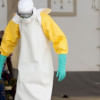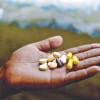Step up efforts to eliminate measles: WHO
Amidst increasing cases and outbreaks of measles globally, World Health Organisation (WHO) today called upon countries in South-East Asia Region to further accelerate efforts to ensure that everyone, everywhere receives the lifesaving benefits of immunisation.
"Governments, communities and health workers must focus on optimizing the benefits of immunization at all ages to prevent life threatening and debilitating diseases. Vaccines work and save lives, we must ensure that everyone, everywhere is benefitted," said Dr Poonam Khetrapal Singh, regional director of WHO South-East Asia, during the ongoing World Immunisation Week.
Preliminary measles surveillance data released recently indicates almost 300 per cent increase in measles cases globally in the first three months of this year as compared to the same period in 2018. In WHO South-East Asia Region, the increase in measles cases in the same period is estimated to be around 40 per cent.
"These are fresh challenges for countries and communities. We must learn from our successes in polio eradication and maternal & neonatal tetanus elimination from the Region. We need to combat these diseases on a war footing to prevent illness and save precious lives," Dr Khetrapal Singh said.
It's World Immunization Week!
Vaccines are one of our best investments for a healthier world. As vaccine coverage has increased, diseases have declined.
Protected together, #VaccinesWork! https://t.co/1HiuB5sCFr pic.twitter.com/HsojA49N4n— World Health Organization (WHO) (@WHO) April 25, 2019
Measles elimination and rubella control has been a flagship priority programme in the WHO South-East Asia Region since 2014. While rubella causes irreversible birth defects, measles is a killer disease. It is one of the most infectious virus known to mankind and can lead to diarrhoea, pneumonia, malnutrition in children and young adults and can even lead to deaths in all age groups.
Since 2014, of the 11 member countries, four - Bhutan, Maldives, DPR Korea and Timor-Leste - have eliminated measles and six - Bangladesh, Bhutan, Maldives, Nepal, Sri Lanka and Timor-Leste - have controlled rubella. Measles-related deaths have decreased by 23 per cent in the Region in the last five years, WHO said in a release.
All member countries have introduced two doses of measles-containing vaccine while ten countries have also introduced vaccines against rubella in their routine immunization programmes.
More than 86 per cent children in the Region under one year of age have been vaccinated with first dose of measles containing vaccine and 76 per cent with second dose of measles containing vaccine in routine immunization. To bridge the immunity gap, mass vaccination campaigns with measles and rubella vaccine are being conducted in countries.
It's World Immunization Week!
Vaccine-preventable diseases include:
Cervical cancer
Cholera
Diphtheria
Hep B
Influenza
Japanese encephalitis
Measles
Meningitis
Mumps
Pertussis
Pneumonia
Polio
Rabies
Rotavirus
Rubella
Tetanus
Typhoid
Varicella
Yellow Fever#VaccinesWork! pic.twitter.com/ppyyAu9SnV— World Health Organization (WHO) (@WHO) April 23, 2019
Nearly half-a-billion children have been vaccinated with measles containing vaccine in the Region in the last five years. These efforts have helped avert approximately 500,000 deaths due to measles annually.
"Though dramatic gains have been made against both diseases, accelerated progress is needed to achieve the Region's flagship priority to eliminate measles and control rubella, to contribute to WHO's 'triple billion' global goals and to fully implement the UN Secretary General's Global Strategy for Women's, Children's and Adolescents' Health."
Robust immunisation systems are needed to harness vaccination's full potential so that every child in the Region is healthy, happy and has full protection against all vaccine-preventable diseases, the Regional Director said.
World Immunisation Week – celebrated in the last week of April every year – aims to promote the use of vaccines to protect people of all ages against disease.
Immunisation saves millions of lives every year and is widely recognised as one of the world's most successful and cost-effective health interventions.
This year's theme is "Protected Together – Vaccines Work".

 For all latest news, follow The Daily Star's Google News channel.
For all latest news, follow The Daily Star's Google News channel. 








Comments